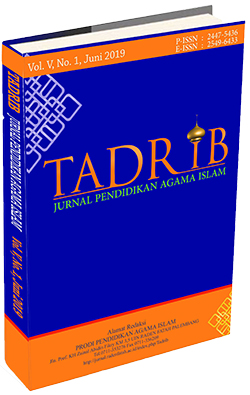Teacher Coaching Model in Improving Students' Qur'an Reading Ability at MTs Istiqomah Muara Teweh, North Barito Regency
DOI:
https://doi.org/10.19109/tadrib.v11i2.29855Keywords:
Teacher Coaching, Reading the Qur'an, Tajweed, TartilAbstract
This study was conducted to describe the teacher coaching model in improving students' Qur'an reading ability at MTs Istiqomah Muara Teweh, North Barito Regency. A descriptive qualitative approach was used in this study with data collection techniques through observation, interviews, documentation, testing, and data validation through triangulation techniques. From the results of the study, the coaching model chosen is the Tartil model, which uses the Iqro method and the ummi method in accordance with the method mastered by the teacher and the suitability for students. There are three main stages in the implementation of coaching, which include the opening session, the core session, and the closing session, with an emphasis on proper pronunciation, the law of tajweed, and reading fluency. Supporting factors for coaching success include motivation and support for students and adequate infrastructure, while the main obstacles come from a lack of coaching time and fluctuations in students' emotions. A 24-day trial involving nine grade VII A students showed that eight students experienced significant improvements in Qur'anic reading ability, especially in the legal aspects of reading, and proper short duration (mad). This study concludes that a teacher coaching model that is structured and adjusted to the level of ability of students in an organized manner can improve students' ability to read the Qur'an in accordance with the rules of tajweed
References
Ajahari. (2018). Ulumul Qur’an(Ilmu-ilmu Al-Qur’an).
Andi & Nik. (2022). Model Pembelajaran Kooperatif (COOPERATIVE LEARNING MODEL). Visipena Journal, 2(1), 21–27.
Djaali. (2021). Metodologi Penelitian Kuantitatif. Bumi Aksara.
Evi, F. R. (2019). Teknologi Pembelajaran: Implementasi Pembelajaran Era 4.0.UIN Sunan Ampel Press. (Vol. 1, Issue 1).
Hanyfah, S., Fernandes, G. R., & Budiarso, I. (2022a). Penerapan Metode Kualitatif Deskriptif. Semnas Ristek (Seminar Nasional Riset Dan Inovasi Teknologi), 6(1), 339–344.
Hanyfah, S., Fernandes, G. R., & Budiarso, I. (2022b). Penerapan Metode Kualitatif Deskriptif Untuk Aplikasi Pengolahan Data Pelanggan Pada Car Wash. Semnas Ristek (Seminar Nasional Riset Dan Inovasi Teknologi), 6(1), 339–344. https://doi.org/10.30998/semnasristek.v6i1.5697
Herman, H., & Anhusadar, L. (2022). Pendidikan Islam Anak Suku Bajo: Penelitian Lapangan pada Suku Bajo. Jurnal Obsesi : Jurnal Pendidikan Anak Usia Dini, 6(4), 2665–2676. https://doi.org/10.31004/obsesi.v6i4.2266
Ismail, F. (2018). Satistika Untuk Penelitian Pendidikan Dan Ilmu_Satistika Untuk Penelitian Pendidikan Dan Ilmu-Ilmu Sosial (Cetakan II, p. hlm. 46). Premedia Group.
Mustoip, S., Fazalani, R., Faruqi, D., Andriani, N., Sundari, Tanaka, A., Sarfiah, As, U. S., Pramana, I. B. B. S. A., & Rifai, A. B. (2023). Psikologi pendidikan. Kantor Lombok: Jl. TGH. Badaruddin, Blok G-1 BTN. Apernas Kubah Hijau, Bagu-Pringgarata, Lombok Tengah.
Rajab, L., Saimima, M. S., Pd, M. I., Ambon, L. P. M. I., Saimima, M. S., & Pd, M. I. (n.d.). DAN PEMBELAJARANNYA Penulis Penulis La Rajab , MA.
Safarudin, Kustati & Sepriyanti. (2023). Penelitian Kualitatif. 3, 9680–9694.
Saputra & Putra. (2024). Analisis Konsep Pembelajaran Alquran dengan Metode Iqra : Suatu Kajian Literatur. 2(4).
Sofyan, Fuaddilaah Ali, E. Sartono, Kemas Badaruddin, Muhammad Fauzi, Syarnubi Syarnubi, Fitri Oviyanti, Nyayu Soraya, and S. S. (2024). Analysis of Higher-Order Thinking Skill (HOTS) of Madrasah Ibtidaiyah students in solving open-ended mathematics problems. In AIP Conference Proceedings, 3058(1).
Sukmah, E. W., & Lutfi, S. (2024). Pembinaan Membaca Al-Qur’an Memalui Metode Pra Tilawati Bagi Remaja Kelas X di SMK Al-Ishlah Palangka Raya. 2(5), 1808–1816.
Sukmawati, R., & Tarmizi, M. I. (2022). Bimbingan Membaca Al-Qur’an Bagi Siswa Kelas Xi Dalam Meningkatkan Keterampilan Membaca Al-Qur’an Smk Al Ishlah Palangka Raya. Tjyybjb.Ac.Cn, 27(2), 58–66. http://117.74.115.107/index.php/jemasi/article/view/537
Syarnubi, Syarnubi, Arvin Efriani, Suzana Pranita, Zulhijra Zulhijra, Baldi Anggara, Alimron Alimron, Maryamah Maryamah, and R. R. (2024). “An analysis of student errors in solving HOTS mathematics problems based on the newman procedure.” In In AIP Conference Proceedings: Vol. vol.3058 (Issue no.1). AIP Publishing.
Syukran, A. S. (2019). Fungsi Al-Qur’an bagi Manusia. Al-I’jaz : Jurnal Studi Al-Qur’an, Falsafah Dan Keislaman, 1(2), 90–108. https://doi.org/10.53563/ai.v1i2.21














